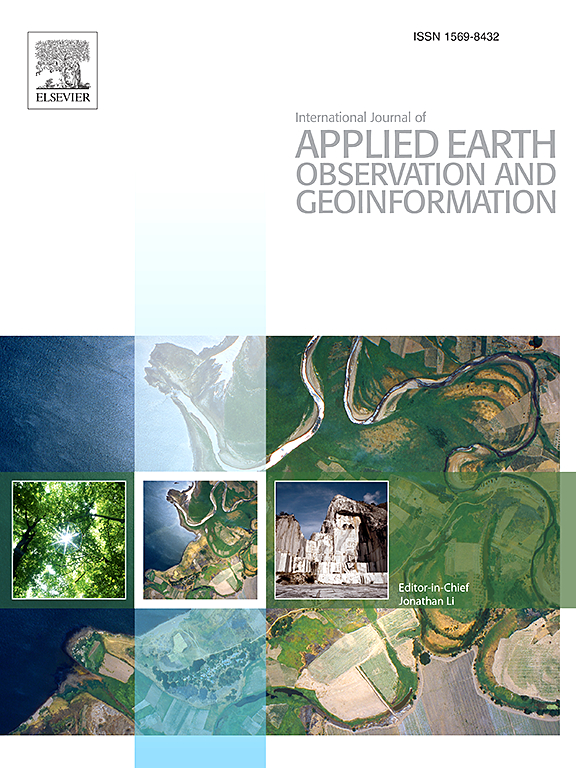A high temporal resolution NDVI time series to monitor drought events in the Horn of Africa
IF 7.6
Q1 REMOTE SENSING
International journal of applied earth observation and geoinformation : ITC journal
Pub Date : 2024-11-15
DOI:10.1016/j.jag.2024.104264
引用次数: 0
Abstract
This study investigates the reconstruction of climatological patterns and vegetation dynamics in the Horn of Africa region using high temporal resolution (i.e. daily) Normalized Difference Vegetation Index (NDVI) datasets. The analysis compares a straight-forward processing approach to derive a daily vegetation index from a geostationary (SEVIRI) satellite with existing NDVI series from geostationary or polar-orbiting (MODIS, MetOp-AVHRR) satellites, highlighting the impact of cloud contamination on data quality in high temporal resolution datasets. Using a smoothing process designed to reconstruct the upper envelope of the vegetation status series, we obtained a daily vegetation dataset that effectively mitigated cloud-induced fluctuations, outperforming polar-orbiting (e.g. MODIS) satellite-derived dataset in capturing regional climatology. We demonstrated this through statistical analysis, including autocorrelation and mean absolute difference between consecutive observations. We showed that cloud contamination significantly affects high temporal resolution NDVI series, particularly in forest areas, which makes it difficult to identify a suitable dataset to validate our approach. Therefore, we mitigated this problem using a Maximum Value Compositing technique, designed to remove cloud-induced biases and further compared our results with another independent vegetation index at coarser temporal resolution derived from AVHRR. We found that our vegetation index closely relates with MODIS 10-day composites after removing cloud-contaminated pixels. Furthermore, the study evaluates the sensitivity of the selected NDVI datasets to drought events, demonstrating the strength of the proposed SEVIRI dataset in capturing the intensity and persistence of vegetation anomalies. In conclusion, the study presents an innovative strategy for deriving daily-resolution NDVI datasets in cloud-prone regions, validating it with independent datasets at different sub-monthly temporal scales.
监测非洲之角干旱事件的高时间分辨率 NDVI 时间序列
本研究利用高时间分辨率(即每日)归一化差异植被指数数据集,调查非洲之角地区气候模式和植被动态的重建情况。分析比较了从地球静止卫星(SEVIRI)和现有的地球静止或极轨道卫星(MODIS、MetOp-AVHRR)归一化差异植被指数系列中得出每日植被指数的简单处理方法,突出了云污染对高时间分辨率数据集数据质量的影响。通过使用旨在重建植被状况序列上包络线的平滑处理,我们获得了一个日植被数据集,该数据集有效地减轻了云层引起的波动,在捕捉区域气候方面优于极轨(如 MODIS)卫星数据集。我们通过统计分析证明了这一点,包括自相关性和连续观测之间的平均绝对差值。我们的研究表明,云污染会严重影响高时间分辨率的 NDVI 序列,尤其是在森林地区,这使得我们很难找到合适的数据集来验证我们的方法。因此,我们使用最大值合成技术来缓解这一问题,该技术旨在消除云层引起的偏差,并将我们的结果与从高级甚高分辨率辐射计获得的另一个时间分辨率更高的独立植被指数进行了进一步比较。我们发现,在剔除受云层污染的像素后,我们的植被指数与 MODIS 10 天合成图密切相关。此外,研究还评估了所选 NDVI 数据集对干旱事件的敏感性,证明了所建议的 SEVIRI 数据集在捕捉植被异常的强度和持续性方面的优势。总之,该研究提出了一种在云雾多发地区获取日分辨率 NDVI 数据集的创新策略,并利用不同次月时间尺度的独立数据集对其进行了验证。
本文章由计算机程序翻译,如有差异,请以英文原文为准。
求助全文
约1分钟内获得全文
求助全文
来源期刊

International journal of applied earth observation and geoinformation : ITC journal
Global and Planetary Change, Management, Monitoring, Policy and Law, Earth-Surface Processes, Computers in Earth Sciences
CiteScore
12.00
自引率
0.00%
发文量
0
审稿时长
77 days
期刊介绍:
The International Journal of Applied Earth Observation and Geoinformation publishes original papers that utilize earth observation data for natural resource and environmental inventory and management. These data primarily originate from remote sensing platforms, including satellites and aircraft, supplemented by surface and subsurface measurements. Addressing natural resources such as forests, agricultural land, soils, and water, as well as environmental concerns like biodiversity, land degradation, and hazards, the journal explores conceptual and data-driven approaches. It covers geoinformation themes like capturing, databasing, visualization, interpretation, data quality, and spatial uncertainty.
 求助内容:
求助内容: 应助结果提醒方式:
应助结果提醒方式:


